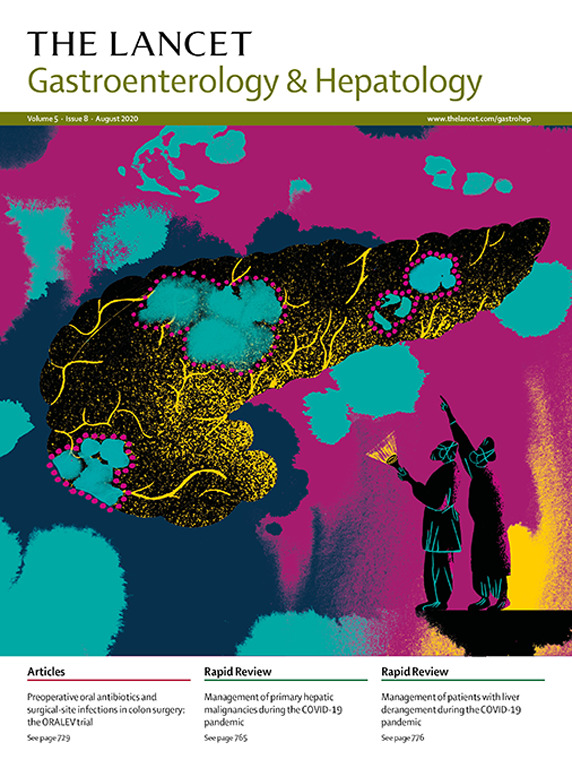行为疗法治疗肠易激综合征的疗效:系统综述和网络荟萃分析
IF 38.6
1区 医学
Q1 GASTROENTEROLOGY & HEPATOLOGY
引用次数: 0
摘要
背景肠易激综合征(IBS)管理指南推荐行为疗法,特别是脑-肠行为疗法,应被视为一种治疗方法。其中一些,如ibs特异性认知行为疗法(CBT)或肠道导向催眠疗法,具有特定的技术,因此属于它们自己的脑-肠行为治疗类别,而其他一些,如压力管理或放松训练,是常见或通用的技术,存在于大多数类别的脑-肠行为治疗中。此外,还有其他行为疗法或治疗方案,包括数字疗法,这些疗法不属于脑-肠行为疗法。我们的目的是评估IBS中现有行为疗法的相对疗效。方法在本系统综述和网络荟萃分析中,我们检索了MEDLINE、EMBASE、EMBASE Classic、PsychINFO和Cochrane中央对照试验注册库(Central Register of Controlled Trials),检索时间从开始到2025年4月23日,以确定随机对照试验(RCTs),比较行为疗法对成年IBS患者的疗效,或对照干预。我们使用整体IBS症状改善的二分法评估疗效。我们采用随机效应模型合并数据,每种干预措施的疗效报告为合并相对危险度(rr), ci为95%。我们根据P值对行为疗法进行排名,P值是一种疗法优于另一种疗法的平均确定性程度,是所有竞争行为疗法的平均值。结果:我们确定了67项符合条件的随机对照试验,包括7441名受试者。治疗完成后,与等候名单对照相比,试验数量最多的行为疗法和招募的患者显示出疗效的是:最小接触CBT(治疗后随访首点整体IBS症状未改善的RR为0.55 [95% CI 0.39 - 0.76], P评分0.78;2项rct, 511例患者)、电话疾病自我管理(0.57 [0.41 - 0.80],P评分0.75;2项试验,746例患者)、动态心理治疗(0.59 [0.43 - 0.80],P评分0.72;3项rct, 303例患者)、CBT (0.65 [0.53 - 0.80], P评分0.64;9项试验,1150例患者)、疾病自我管理(0.68 [0.50 - 0.92],P评分0.58;3项rct, 375例患者)、基于互联网的最小接触CBT (0.77 [0.61 - 0.96], P评分0.43;5项rct, 705例患者)和肠道导向催眠治疗(0.79 [0.66 - 0.95],P评分0.39;12项试验,1507例患者)。治疗完成后,在仅招募难治性症状患者的试验中,电话疾病自我管理和应急管理均优于注意安慰剂对照(分别为0.52[0.28 - 0.94]和0.50[0.26 - 0.96])、常规护理(分别为0.46[0.31 - 0.69]和0.45[0.24 - 0.85])、组CBT(0.50[0.29 - 0.86])、基于互联网的最小接触疾病自我管理(0.58[0.40 - 0.86])。动态心理治疗(0.61[0.44 - 0.86])均优于常规治疗。根据治疗类别研究行为疗法时,对治疗后随访第一时间的整体IBS症状的分析,以及对治疗后随访第一时间的整体IBS症状的分析,与等候名单对照相比,显示出发表偏倚的证据。Cochrane偏倚风险工具显示,没有一项随机对照试验在所有领域均处于低偏倚风险。几种行为疗法对肠易激综合征的整体症状有效,尽管大多数证据都属于脑-肠行为疗法。然而,整个网络中所有直接和间接比较的证据确定性被评为低置信度或极低置信度,部分原因是发表偏倚和纳入试验的偏倚风险。本文章由计算机程序翻译,如有差异,请以英文原文为准。
Efficacy of behavioural therapies for irritable bowel syndrome: a systematic review and network meta-analysis
Background
Irritable bowel syndrome (IBS) management guidelines recommend that behavioural therapies, particularly brain–gut behaviour therapies, should be considered as a treatment. Some, such as IBS-specific cognitive behavioural therapy (CBT) or gut-directed hypnotherapy, have specific techniques and, therefore, are in their own class of brain–gut behaviour therapy, while others, such as stress management or relaxation training, are common or universal techniques that are present in most classes of brain–gut behaviour therapy. In addition, there are other behavioural therapies or treatment options, including digital therapies, which are not classed as brain–gut behaviour therapies. We aimed to evaluate relative efficacy of the available behavioural therapies in IBS.Methods
For this systematic review and network meta-analysis we searched MEDLINE, EMBASE, EMBASE Classic, PsychINFO, and the Cochrane Central Register of Controlled Trials from inception to April 23, 2025, to identify randomised controlled trials (RCTs) comparing the efficacy of behavioural therapies for adults with IBS with each other, or a control intervention. We judged efficacy using dichotomous assessments of improvement in global IBS symptoms. We pooled data with a random effects model, with efficacy of each intervention reported as pooled relative risks (RRs) with 95% CIs. We ranked behavioural therapies according to their P score, which is the mean extent of certainty that one treatment is better than another, averaged over all competing behavioural therapies.Findings
We identified 67 eligible RCTs, comprising 7441 participants. After completion of treatment, and compared with waiting list control, behavioural therapies with the largest numbers of trials, and patients recruited, that showed efficacy were: minimal contact CBT (RR for global IBS symptoms not improving at first point of follow-up post-treatment 0·55 [95% CI 0·39–0·76], P score 0·78; two RCTs, 511 patients), telephone disease self-management (0·57 [0·41–0·80], P score 0·75; two trials, 746 patients), dynamic psychotherapy (0·59 [0·43–0·80], P score 0·72; three RCTs, 303 patients), CBT (0·65 [0·53–0·80], P score 0·64; nine trials, 1150 patients), disease self-management (0·68 [0·50–0·92], P score 0·58; three RCTs, 375 patients), internet-based minimal contact CBT (0·77 [0·61–0·96], P score 0·43; five RCTs, 705 patients), and gut-directed hypnotherapy (0·79 [0·66–0·95], P score 0·39; 12 trials, 1507 patients). After completion of treatment, among trials recruiting only patients with refractory symptoms, telephone disease self-management and contingency management were both superior to attention placebo control (0·52 [0·28–0·94] and 0·50 [0·26–0·96], respectively) and routine care (0·46 [0·31–0·69] and 0·45 [0·24–0·85], respectively), and group CBT (0·50 [0·29–0·86]), internet-based minimal contact disease self-management (0·58 [0·40–0·86]), and dynamic psychotherapy (0·61 [0·44–0·86]) were all superior to routine care. Analyses for global IBS symptoms at first point of follow-up post-treatment, and for global IBS symptoms at first point of follow-up post-treatment when behavioural therapies were studied according to treatment class, showed evidence of publication bias when compared with waiting list control. The Cochrane risk of bias tool indicated that no RCT was at low risk of bias across all domains.Interpretation
Several behavioural therapies are efficacious for global symptoms in IBS, although the most evidence exists for those classed as brain–gut behaviour therapies. However, certainty in the evidence for all direct and indirect comparisons across the network were rated as either low or very low confidence, due in part to publication bias and the risk of bias of the included trials.Funding
None.求助全文
通过发布文献求助,成功后即可免费获取论文全文。
去求助
来源期刊

Lancet Gastroenterology & Hepatology
Medicine-Hepatology
CiteScore
50.30
自引率
1.10%
发文量
0
期刊介绍:
The Lancet Gastroenterology & Hepatology is an authoritative forum for key opinion leaders across medicine, government, and health systems to influence clinical practice, explore global policy, and inform constructive, positive change worldwide.
The Lancet Gastroenterology & Hepatology publishes papers that reflect the rich variety of ongoing clinical research in these fields, especially in the areas of inflammatory bowel diseases, NAFLD and NASH, functional gastrointestinal disorders, digestive cancers, and viral hepatitis.
 求助内容:
求助内容: 应助结果提醒方式:
应助结果提醒方式:


